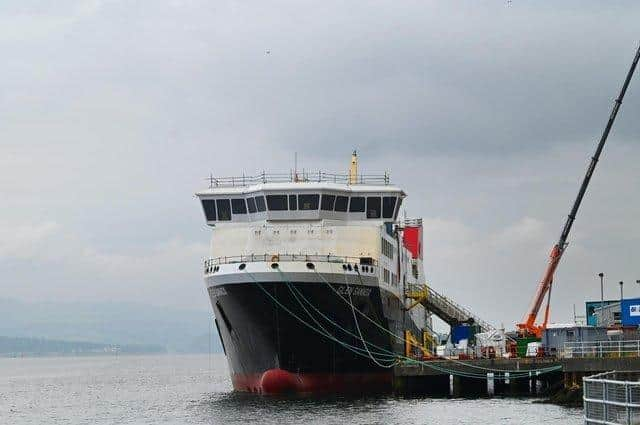Ferguson Marine has received £70m in taxpayer funding since nationalisation, figures show
This article contains affiliate links. We may earn a small commission on items purchased through this article, but that does not affect our editorial judgement.
Confirmation of the figures comes shortly after the Scottish Government committed to spending at least £180,000 on a review of the shipyard’s competitiveness and productivity, starting in late July and being completed by the end of October.
The ailing shipyard has been at the centre of a political storm in recent months after an Audit Scotland report criticised the Government’s decision to award a contract for the vessels in 2015, before it was nationalised.
Advertisement
Hide AdAdvertisement
Hide AdMinisters were warned of significant risks associated with the contract due to the lack of a full builder’s refund guarantee, which would have seen the majority of the cost of any potential overspend fall on the shipyard.
Audit Scotland said there was not sufficient documentary evidence as to why ministers decided to award the contract to Ferguson Marine despite these risks.
Critics have repeatedly called for a full public inquiry into the fiasco in which the ferries are now five years late and more than £150m over budget.
New figures published by the Government show the extent of the financial pressure associated with the shipyard, with £70m of grant-in-aid funding and capital funding being paid to Ferguson Marine since December 2019.


Much of the money originated from the Government’s directorate for Covid Business Resilience and Support. The Government was asked for an explanation as to why the funding originated from this part of government.
Officials said the money does not relate to pandemic business support schemes.
In total, £30.4m was spent specifically on “capital payments … for the build of vessel’s 801 and 802”, with a further £4m on “grant payment[s]” directly linked to the construction of the ferries.
This was received by the yard between June and December last year, with Ferguson Marine announcing a delay to the two ships’ construction in February 2022 due to the yard having the wrong length of cable for hull 801.
Advertisement
Hide AdAdvertisement
Hide AdThis led to yet another delay of eight months, with 801, named the Glen Sannox, now due to be finished by May 2023.
Hull 802 will not be ready until the end of 2023 at the earliest.
Scottish Conservative transport spokesperson Graham Simpson said the Government has failed to make the shipyard “viable”.
A further £32m was received by Ferguson Marine in the form or “grant in aid”, a method of funding public bodies that have a degree of independence.
Other generically labelled funding brings the overall total to £71.9m, with a further £234,155 spent on consultancy services and site supervision costs for ferry infrastructure agency CMAL.
Mr Simpson said: “The SNP were supposed to turn the shipyard around and make it a viable enterprise. In reality they have simply been propping it up with public funding, while a succession of ministers and experts have failed to revive its fortunes or deliver either of the two ferries we were promised.
“Even the £30m pumped directly into Hulls 801 and 802 could not prevent these lifeline ferries from being delayed by a further six months.
“With Audit Scotland warning that costs may rise even further, the SNP have urgent questions to answer from frustrated taxpayers and island residents alike.”
Advertisement
Hide AdAdvertisement
Hide AdA Scottish Government spokesperson said the £70m published in the report includes loan funding provided to FMEL pre-nationalisation and capital funding.
In total, the spokesperson said, ministers have provided £81m in capital funding to construct hulls 801 and 802 since nationalisation.
The spokesperson said: “The payments in the document do not relate to Covid business support schemes. The figures relate to all payments made to Ferguson Marine during the period.
"Predominantly these payments are to progress the delivery of vessels 801 and 802 as well as to support the general day to day running of the shipyard.”
Want to hear more from The Scotsman's politics team? Check out the latest episode of our political podcast, The Steamie.
It's available wherever you get your podcasts, including Apple Podcasts and Spotify.
Comments
Want to join the conversation? Please or to comment on this article.

